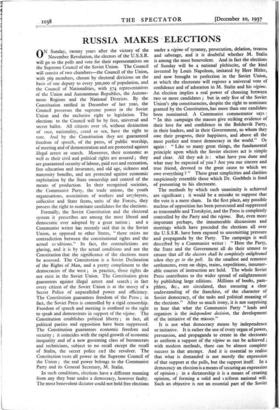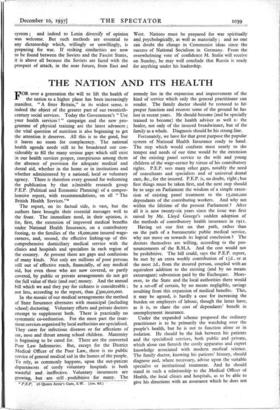RUSSIA MAKES ELECTIONS
ON Sunday, twenty years after the victory of the November Revolution, the electors of the U.S.S.R. will go to the polls and vote for their representatives on the Supreme Council of the Soviet Union. The Council will consist of two chambers—the Council of the Union, with 569 members, chosen by electoral divisions on the basis of one deputy to every 300,000 of population, and the Council of Nationalities, with 574 representatives of the Union and Autonomous Republics, the Autono- mous Regions and the National Districts. By the Constitution ratified in December of last year, the Council possesses the supreme power in the Soviet Union and the exclusive right to legislation. The elections to the Council will be by free, universal and secret ballot. All citizens over 18, without distinction of race, nationality, creed or sex, have the right to vote. And by the Constitution they are guaranteed freedom of speech, of the press, of public worship, of meeting and of demonstration and are protected against illegal arrest or search. Moreover, their economic as well as their civil and political rights are assured ; they are guaranteed security of labour, paid rest and recreation, free education and insurance, and old age, sickness and maternity benefits, and are protected against economic exploitation by the State ownership and control of the means of production. In their recognised societies, the Communist Party, the trade unions, the youth organisations, associations of workers and employees, collective and State farms, units of the Forces, they possess the right to nominate candidates for the elections.
Formally, the Soviet Constitution and the electoral system it prescribes are among the most liberal and democratic ever adopted by a great nation ; and a Communist writer has recently said that in the Soviet Union, as opposed to other States, "there exists no contradiction between the constitutional rights and the actual anditions." In fact, the contradictions are glaring, and it is by the actual conditions and not the Constitution that the significance of the elections must be assessed. The Constitution is a Soviet Declaration of the Rights of Man, and a pretty compliment to the democracies of the west ; in practice, those rights do not exist in the Soviet Union. The Constitution gives guarantees against illegal arrest and search ; in fact every citizen of the Soviet Union is at the mercy of a Secret Police of unparalleled power and efficiency. The Constitution guarantees freedom of the Press ; in fact, the Soviet Press is controlled by a rigid censorship.
Freedom of speech and meeting is confined to the right to speak and demonstrate in support of the regime. The Constitution establishes political liberty ; in fact, all political parties and opposition have been suppressed. The Constitution guarantees economic freedom and security ; it coincides with the rapid.growth of economic inequality and of a new governing class of bureaucrats and technicians, subject to no recall except the recall of Stalin, the secret police and the revolver. The Constitution vests all power in the Supreme Council of the Union ; the real power belongs to the Communist Party and its General Secretary, M. Stalin.
In such conditions, elections have a different meaning from any they bear under a democracy, however faulty. The most benevolent dictator could not hold free elections under a re'gime of tyranny, persecution, delation, treason and sabotage, and it is doubtful whether M. Stalin is among the most benevolent. And in fact the elections of Sunday will be a national plebiscite, of the kind invented by Louis Napoleon, imitated by Herr Hitler, and now brought to perfection in the Soviet Union, at which the electorate will register a universal vote of confidence and of adoration in M. Stalin and his regime. An election implies a real power of choosing between two or more candidates ; but in only five of the Soviet Union's 569 constituencies, despite the right to nominate granted by the Constitution, has more than one candidate been nominated. A Communist commentator says : "In this campaign the masses give striking evidence of their love for and confidence in the Bolshevik Party, in their leaders, and in their Government, to whom they owe their progress, their happiness, and above all the most perfect and truest democracy in the world." Or again : "Like so many great things, the fundamental principle upon which the Soviet electors act is simple and clear. All they ask is : what have you done and what may be expected of you ? Are you our sincere and true friend, devoted to the great cause to which we owe everything ? " These great simplicities and clarities suspiciously resemble those which Dr. Goebbels is fond of presenting to his electorate.
The methods by which such unanimity is achieved are significant ; it would be a mistake to suppose that the vote is a mere sham. In the first place, any possible nucleus of opposition has been persecuted and suppressed as treasonable and Trotskyist, and the Press is completely controlled by the Party and the re'gime. But, even more important perhaps, the innumerable discussions and meetings which have preceded the elections all over the U.S.S.R. have been exposed to unremitting pressure and propaganda by the Party. The campaign is well described by a Communist writer : "Here the Party, the State and the Government all do their utmost to ensure that all the electors shall be completely enlightened when they go to the poll. In the smallest and remotest settlements, even on ships, trains, expeditions, innumer- able courses of instruction are held. The whole Soviet Press contributes to the wider spread of enlightenment by publishing large editions. Millions of books, pam- phlets, &c., are circulated, thus ensuring a clear understanding of the franchise, of the character of Soviet democracy, of the tasks and political meaning of the elections." After so much irony, it is not surprising to hear that what the Communist Party "leads and organises is the independent decision, the development of the initiative of the Masses."
It is not what democracy means by independence or initiative. It is rather the use of every organ of power, persuasion, and propaganda to create in the electorate as uniform a support of the re'gime as can be achieved ; with modern methods, there can be almost complete success in that attempt. And it is essential to realise that what is demanded is not merely the expression of that support at the polls, but the support itself. In a democracy an election is a means of securing an expression of opinion ; in a dictatorship it is a means of creating opinion, of forming a solid and t niform national will. Such an objective is not an essential part of the Soviet system ; and indeed to Lenin diversify of opinion was welcome. But such methods are essential to any dictatorship which, willingly or unwillingly, is preparing for war. If striking similarities are now to be found between the Soviets and the Fascist States, it is above all because the Soviets are faced with the prospect of attack, in the near future, from East and West. Nations must be prepared for war spiritually and psychologicallY, as well as materially ; and no one can doubt the change in Communist ideas since the success of National Socialism in Germany. From the overwhelming vote of confidence M. Stalin will receive on Sunday, he may well conclude that Russia is ready for anything under his leadership.























































 Previous page
Previous page